兰斯顿·休斯诗歌中的黑人身份
兰斯顿_休斯诗歌的喻指分析
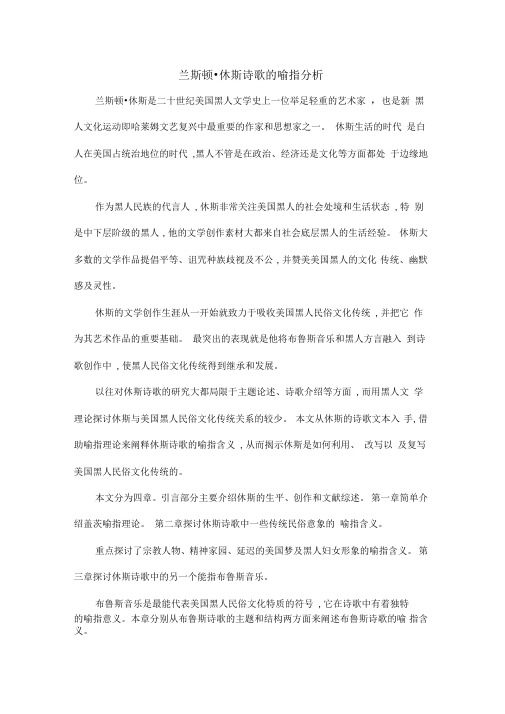
兰斯顿•休斯诗歌的喻指分析兰斯顿•休斯是二十世纪美国黑人文学史上一位举足轻重的艺术家,也是新黑人文化运动即哈莱姆文艺复兴中最重要的作家和思想家之一。
休斯生活的时代是白人在美国占统治地位的时代,黑人不管是在政治、经济还是文化等方面都处于边缘地位。
作为黑人民族的代言人, 休斯非常关注美国黑人的社会处境和生活状态, 特别是中下层阶级的黑人, 他的文学创作素材大都来自社会底层黑人的生活经验。
休斯大多数的文学作品提倡平等、诅咒种族歧视及不公, 并赞美美国黑人的文化传统、幽默感及灵性。
休斯的文学创作生涯从一开始就致力于吸收美国黑人民俗文化传统, 并把它作为其艺术作品的重要基础。
最突出的表现就是他将布鲁斯音乐和黑人方言融入到诗歌创作中, 使黑人民俗文化传统得到继承和发展。
以往对休斯诗歌的研究大都局限于主题论述、诗歌介绍等方面, 而用黑人文学理论探讨休斯与美国黑人民俗文化传统关系的较少。
本文从休斯的诗歌文本入手, 借助喻指理论来阐释休斯诗歌的喻指含义, 从而揭示休斯是如何利用、改写以及复写美国黑人民俗文化传统的。
本文分为四章。
引言部分主要介绍休斯的生平、创作和文献综述。
第一章简单介绍盖茨喻指理论。
第二章探讨休斯诗歌中一些传统民俗意象的喻指含义。
重点探讨了宗教人物、精神家园、延迟的美国梦及黑人妇女形象的喻指含义。
第三章探讨休斯诗歌中的另一个能指布鲁斯音乐。
布鲁斯音乐是最能代表美国黑人民俗文化特质的符号, 它在诗歌中有着独特的喻指意义。
本章分别从布鲁斯诗歌的主题和结构两方面来阐述布鲁斯诗歌的喻指含义。
第四章探讨休斯诗歌中黑人方言的喻指意义。
黑人方言是在种族压迫和文化霸权统治下产生的特殊的语言变体。
它是黑人之间交流和表达自己思想的重要工具, 蕴含着丰富的社会含义。
本章为说明休斯的诗歌是如何借用黑人方言体现喻指含义, 着重分析了休斯诗歌中黑人方言的喻指手段。
最后,文章在结论部分指出: 借用喻指理论来解读休斯诗歌的含义,可以深刻揭示休斯是如何借用、改写和复写黑人民俗文化传统, 从而达到折射美国黑人的文化心理及真实的社会生活状况的目的。
兰斯顿·休斯诗歌思想特征和艺术创新
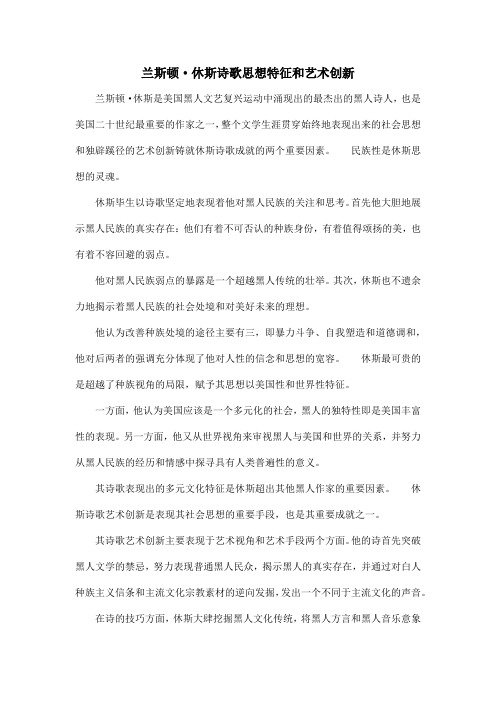
兰斯顿·休斯诗歌思想特征和艺术创新兰斯顿·休斯是美国黑人文艺复兴运动中涌现出的最杰出的黑人诗人,也是美国二十世纪最重要的作家之一,整个文学生涯贯穿始终地表现出来的社会思想和独辟蹊径的艺术创新铸就休斯诗歌成就的两个重要因素。
民族性是休斯思想的灵魂。
休斯毕生以诗歌坚定地表现着他对黑人民族的关注和思考。
首先他大胆地展示黑人民族的真实存在:他们有着不可否认的种族身份,有着值得颂扬的美,也有着不容回避的弱点。
他对黑人民族弱点的暴露是一个超越黑人传统的壮举。
其次,休斯也不遗余力地揭示着黑人民族的社会处境和对美好未来的理想。
他认为改善种族处境的途径主要有三,即暴力斗争、自我塑造和道德调和,他对后两者的强调充分体现了他对人性的信念和思想的宽容。
休斯最可贵的是超越了种族视角的局限,赋予其思想以美国性和世界性特征。
一方面,他认为美国应该是一个多元化的社会,黑人的独特性即是美国丰富性的表现。
另一方面,他又从世界视角来审视黑人与美国和世界的关系,并努力从黑人民族的经历和情感中探寻具有人类普遍性的意义。
其诗歌表现出的多元文化特征是休斯超出其他黑人作家的重要因素。
休斯诗歌艺术创新是表现其社会思想的重要手段,也是其重要成就之一。
其诗歌艺术创新主要表现于艺术视角和艺术手段两个方面。
他的诗首先突破黑人文学的禁忌,努力表现普通黑人民众,揭示黑人的真实存在,并通过对白人种族主义信条和主流文化宗教素材的逆向发掘,发出一个不同于主流文化的声音。
在诗的技巧方面,休斯大肆挖掘黑人文化传统,将黑人方言和黑人音乐意象引入诗歌,并利用黑人音乐的内在形式和外在形式创造新的表现手段;另一方面,休斯借鉴现代派诗歌手段,将其与黑人文化嫁接,形成一种反主流的诗歌样式。
休斯通过思想上的超越和艺术上的创新形成一个新的文学传统,对美国文学和文化发展具有重要意义和深远的影响。
首先,这一传统在思想内容和艺术形式上成为美国黑人诗歌的里程碑;其次,这一传统标志着黑人美学思想的飞跃;同时,它从思想上尤其是艺术形式上对美国黑人诗歌产生了持久的直接影响,极大地丰富了美国文学,推动了黑人文学对白人文学霸权的消解。
黑人文化的歌者(中)兰斯顿休斯
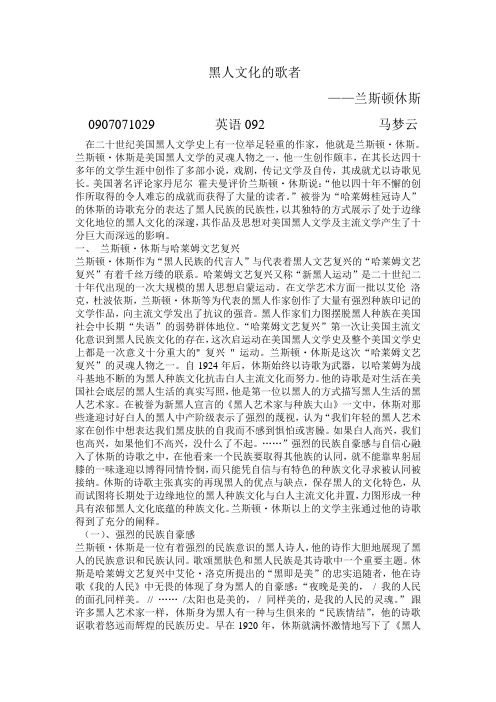
黑人文化的歌者——兰斯顿休斯0907071029 英语092 马梦云在二十世纪美国黑人文学史上有一位举足轻重的作家,他就是兰斯顿・休斯。
兰斯顿・休斯是美国黑人文学的灵魂人物之一,他一生创作颇丰,在其长达四十多年的文学生涯中创作了多部小说,戏剧,传记文学及自传,其成就尤以诗歌见长。
美国著名评论家丹尼尔霍夫曼评价兰斯顿・休斯说:“他以四十年不懈的创作所取得的令人难忘的成就而获得了大量的读者。
”被誉为“哈莱姆桂冠诗人”的休斯的诗歌充分的表达了黑人民族的民族性,以其独特的方式展示了处于边缘文化地位的黑人文化的深邃,其作品及思想对美国黑人文学及主流文学产生了十分巨大而深远的影响。
一、兰斯顿・休斯与哈莱姆文艺复兴兰斯顿・休斯作为“黑人民族的代言人”与代表着黑人文艺复兴的“哈莱姆文艺复兴”有着千丝万缕的联系。
哈莱姆文艺复兴又称“新黑人运动”是二十世纪二十年代出现的一次大规模的黑人思想启蒙运动。
在文学艺术方面一批以艾伦洛克,杜波依斯,兰斯顿・休斯等为代表的黑人作家创作了大量有强烈种族印记的文学作品,向主流文学发出了抗议的强音。
黑人作家们力图摆脱黑人种族在美国社会中长期“失语”的弱势群体地位。
“哈莱姆文艺复兴”第一次让美国主流文化意识到黑人民族文化的存在,这次启运动在美国黑人文学史及整个美国文学史上都是一次意义十分重大的" 复兴" 运动。
兰斯顿・休斯是这次“哈莱姆文艺复兴”的灵魂人物之一。
自1924年后,休斯始终以诗歌为武器,以哈莱姆为战斗基地不断的为黑人种族文化抗击白人主流文化而努力。
他的诗歌是对生活在美国社会底层的黑人生活的真实写照,他是第一位以黑人的方式描写黑人生活的黑人艺术家。
在被誉为新黑人宣言的《黑人艺术家与种族大山》一文中,休斯对那些逢迎讨好白人的黑人中产阶级表示了强烈的蔑视,认为“我们年轻的黑人艺术家在创作中想表达我们黑皮肤的自我而不感到惧怕或害臊。
如果白人高兴,我们也高兴,如果他们不高兴,没什么了不起。
黑人

“我的灵魂变得像河流一般深邃。” 我的灵魂变得像河流一般深邃。 我的灵魂变得像河流一般深邃
第二节只这一行,它的作用是承上启下。 第二节只这一行,它的作用是承上启下。 承上启下 上一节对河流的认识仅限于 了解” 对河流的认识仅限于“ 上一节对河流的认识仅限于“了解”, 到了这一节 这一节, 已经深入地用 深入地用“ 到了这一节,“我”已经深入地用“灵 去感受河流。换句话说, 魂”去感受河流。换句话说,黑人的 灵魂”因见证“河流” 历史) “灵魂”因见证“河流”(历史)而深 下面一节,则是由此开始的历史回 邃。下面一节,则是由此开始的历史回 顾。
教学小结: 教学小结:
这首诗显示了黑人对自己种族的自豪感。 这首诗显示了黑人对自己种族的自豪感。 黑人对自己种族的自豪感 在诗人生活的时代, 在诗人生活的时代,种族歧视的恶习在美 国还没有根除, 国还没有根除,诗人代表自己的种族写下 了这样的诗篇,无疑具有很强的号召力。 了这样的诗篇,无疑具有很强的号召力。 另外, 另外,从这首诗中我们还能感受到诗人 一种淡淡的忧伤。 一种淡淡的忧伤。这种忧伤源于黑人悠 久的历史和深重的苦难。 久的历史和深重的苦难。
刚果河是非洲流域面积最大的河流, 刚果河是非洲流域面积最大的河流,尼罗河 是世界最长的河流。 是世界最长的河流。尼罗河流域也诞生过灿 烂的古代文明。 烂的古代文明。
“当林肯去新奥尔良时,/我听到密西西 当林肯去新奥尔良时,/我听到密西西 去新奥尔良时,/我听到 比河的歌声,/我瞧见它那浑浊的胸膛 的歌声,/ 比河的歌声,/我瞧见它那浑浊的胸膛 在夕阳下闪耀金光。 /在夕阳下闪耀金光。” 密西西比河是北美洲最大的河流。 密西西比河是北美洲最大的河流。林肯 在担任美国总统时,废除了奴隶制, 在担任美国总统时,废除了奴隶制,使 美国的黑奴获得解放。 美国的黑奴获得解放。 以上是诗人以夸张的手法回顾历史。 以上是诗人以夸张的手法回顾历史。 的身影掠过亚、 美三大洲, “我”的身影掠过亚、非、美三大洲, 从古代到现代, 从古代到现代,在每一个地方都有令 难忘的河流。 “我”难忘的河流。
兰斯顿·休斯黑人文化的歌者——以《黑人谈河流》为例
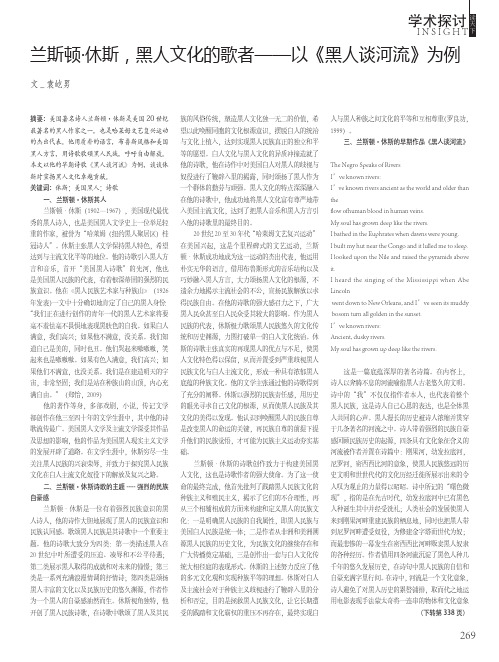
论兰斯顿.休斯的《我也歌唱美国》中黑人的深切痛楚
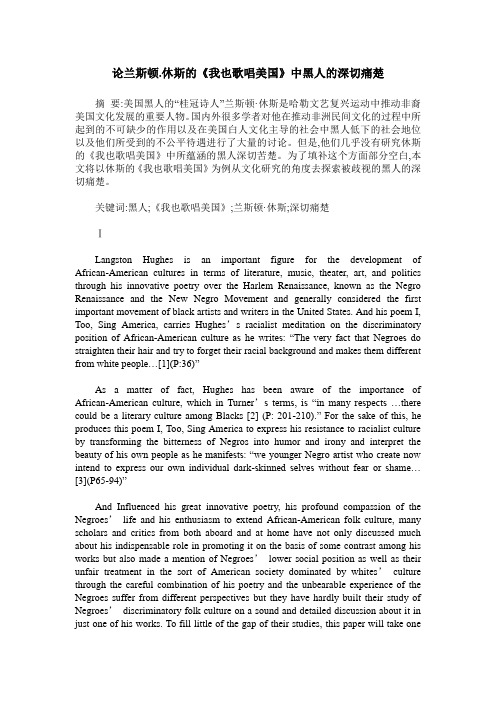
论兰斯顿.休斯的《我也歌唱美国》中黑人的深切痛楚摘要:美国黑人的“桂冠诗人”兰斯顿·休斯是哈勒文艺复兴运动中推动非裔美国文化发展的重要人物。
国内外很多学者对他在推动非洲民间文化的过程中所起到的不可缺少的作用以及在美国白人文化主导的社会中黑人低下的社会地位以及他们所受到的不公平待遇进行了大量的讨论。
但是,他们几乎没有研究休斯的《我也歌唱美国》中所蕴涵的黑人深切苦楚。
为了填补这个方面部分空白,本文将以休斯的《我也歌唱美国》为例从文化研究的角度去探索被歧视的黑人的深切痛楚。
关键词:黑人;《我也歌唱美国》;兰斯顿·休斯;深切痛楚ⅠLangston Hughes is an important figure for the development of African-American cultures in terms of literature, music, theater, art, and politics through his innovative poetry over the Harlem Renaissance, known as the Negro Renaissance and the New Negro Movement and generally considered the first important movement of black artists and writers in the United States. And his poem I, Too, Sing America, carries Hughes’s racialist meditation on the discriminatory position of African-American cul ture as he writes: “The very fact that Negroes do straighten their hair and try to forget their racial background and makes them different from white people…[1](P:36)”As a matter of fact, Hughes has been aware of the importance of African-American culture, which in Turner’s terms, is “in many respects …there could be a literary culture among Blacks [2] (P: 201-210).” For the sake of this, he produces this poem I, Too, Sing America to express his resistance to racialist culture by transforming the bitterness of Negros into humor and irony and interpret the beauty of his own people as he manifests: “we younger Negro artist who create now intend to express our own individual dark-skinned selves without fear or shame…[3](P65-94)”And Influenced his great innovative poetry, his profound compassion of the Negroes’life and his enthusiasm to extend African-American folk culture, many scholars and critics from both aboard and at home have not only discussed much about his indispensable role in promoting it on the basis of some contrast among his works but also made a mention of Negroes’lower social position as well as their unfair treatment in the sort of American society dominated by whites’culture through the careful combination of his poetry and the unbearable experience of the Negroes suffer from different perspectives but they have hardly built their study of Negroes’discriminatory folk culture on a sound and detailed discussion about it in just one of his works. To fill little of the gap of their studies, this paper will take oneof his poems, I, Too, Sing America, as an example to make an exploration of the discriminated Negroes’sound bitterness.ⅡAs for foreign studies upon I, Too, Sing America, most of them has made a great exploration on Hughes’s poetical styles in some of his poems from different perspectives, their innovative findings having inspired a great many scholars but few foreign scholars have made a direct mention of this poem, let alone focusing their studies on the sort of sound bitterness the Negroes suffer. Therefore, this paper cannot but make a relevant review of foreign studies as regards foreign scholars’current studies of this poem. But for the sake of the limited content to be carried in this research and the relevance to this research, there will be just the studies of three foreign scholars (Rampersad, Brooks and Hitchens) just to be covered as a review both to share their insightful comments, arguments or conclusions and also find out the academic gap left in their studies and the tenable space for this paper.As Rampersad mentions this poem in his studies directly, so his studies center on the discussion of the Writer’s descriptive styles in I, Too, Sing America and the closely-knit combination of his poems with his own personal experience and the valuable relevance to the life of Black people. His study mentions (The Life of Langston Hughes, V olume Ⅰ, 1902-1941): “I, Too, Sing America is a sympathetic, yet clear-eyed portrait of one of America’s most controversial writers that also manages to be a sweeping depiction of the black experience in this country and abroad during the first four decades of t he 20th century[4](P:1005).” Besides, Rampersad dose not shy away from “the ambiguities and ironies in Hughes’s life: his possible homosexuality… [4](P: 1005)” So to speak, Rampersad’s study covers both the strength and the weakness of Hughes’s life and reveals both the success and the failure of his work equally.Unlike the studies of Rampersad, Brooks proposes his opposite views on the Huges’s worries about the quality of his work. He argues that Hughes makes his response to his personal encounter with racism rather his sorrows about his devotion to his poetic craft, with great eager to polish it. In his terms, “Hughes is simply not very vulnerable… [5](P: 7)” Additionally, Brooks’s study also presents to us Hughes’s sound concern for his people as he cla ims, “America never was America to me…[5](P:9)”due to his intolerance to see the poor situation of his Darker Brother.Similar to the situation of that in I, Too, Sing America, Hitchens finds out that Hughes has spent a lot of time in white schools and classes, and has little choice but to bear him-self bravely when subjected to vulgar abuses and discrimination after his intensive reading many of Hughes’s works. In his studies, he learns from Rampersad that Hughes has made a distinct impression with his work Good bye Christ and Good Morning Revolution, as well as his plays on the Scottboro case and other outrages ofracialism. To find some evidence in this respect, he quotes from Rampersad “On each of the few occasions in his (Hughes’s) life when his internal pressures proved too great to bear, the cause would be private rather than racial [6] (P: 22).” But Hitchens still argues that there is no evidence that color plays much role in his unhappiness. .The analysis and contrast mentioned previously in this paper shows that foreign studies center on Hughes’s individual experience, his innovative poetic styles and the discrimination he writes in his works. But they have made little study of or even made no mention of this poem, I, Too, Sing America let alone the soundness of the Negroes’bitterness in their mind when discriminated or insulted by whites.As far as the exploration on Hughes’s works and humorous poetic language is concerned, a Chinese scholar named Luo Liang-gong, has focused his study on a detailed and penetrative analysis of Hughes’s creating conceptions and art to emphasize the endless efforts and explorations throughout his life by interpreting his humor, which reflects two strategies the Negroes take: the strategy they take for a better life and that to prevent the whites from destroying the eternal and internal environment subservient to their development. The heart of his studies relies on the interpretation of Hughes’s humor, which in Luo’s mind, is the core value of the Negroes’exclusive psychological mechanism and cultural tradition that they draw from their experience along American continent. In addition to these cultural significance, Luo holds that Hughes’s humor is one the one hand, a bond that links the unbendable fortitude in fighting against whites’dominant culture to reach his dream of seeking for democracy and liberty to humanity, both the strategic choice he takes to convey his democratic conception and an important approach for him to convey his firm faith of humanity, and on the other hand, a crucial element of Hughes’s literary works [11] (P: 25).To fill little of the gap of their studies, this paper will take one of his poems, I, Too, Sing America, as an example to make an exploration of the discriminated Negroes’sound bitterness from the perspective of Culture Studies.ⅢAs arranged, this paper will take just Culture Studies as theoretical support to make a study of the discriminated Negroes’sound bitterness and fill little of this gap with this study. Therefore, it is better to give a short account of Culture Studies.Culture Studies, “starting with a clear purpose of defining objects of a study and a research institute, the Centre for Contemporary Cultural Studies established by Raymond Williams in Birmingham Univer sity in 1964[14](P:340),” is a field that will not be parceled out to the available disciplines. It spans culture at large, not this or that separated elements of culture. Critics generally believes that The Use of Literary (1957) by Richard Hoggart and Culture and Society 1780-1950(1958) by RaymondWilliams mark the beginning of British Culture Studies. From 1980s, the American cultural studies began to discuss power relation in class, gender and ethnicity.Since this paper aims to make a study of the Negroes’sound bitterness from the perspective of Culture Studies, so it is quite appropriate to employ cultural criticism to reach it.Actually, it is a new perspective to make an exploration to interpret the text grid because it can bring it new interpretation and shed to it new light. Originally, cultural criticism does not offer a single way of analyzing literature as there is no central method is associated with cultural criticism, nor with literary texts in the conventional sense. Instead, it borrows method from other approaches to interpret a wide range of cultural products and practice. As a Marxist intellectual, Williams call his approach Cultural Materialism but later scholar drops that name for cultural criticism and cultural studies, which “shares three general ways to study culture: British Cultural Materialism, The New Historicism, and American Multiculturalism[15](240-254).”Critically, this paper will take some critical views in terms of racism as theoretical support to develop its statements to shed a new light on his attitude toward the racial discrimination in terms of the negative role of the school book in education system which lead to the misinterpretations of race, attitude and value.ⅣTo sum up, I, Too, Sing America carries the Negros’sound bitterness to stand the unbearable treatment they suffer from the white people, to resist the white people’s dominant bias toward them and their folk culture, to develop their own culture and to make them accepted by American society but due to the limitations of the social reality at that time his dream of multiculturalism as well as the bloom of democratic flower can not be realized in practice but be imagined in mind. Therefore, it takes longer time and more efforts of all the Negroes and other people who are friendly to help the Negroes to be free from the discrimination and segregation and to bring them to a world of equality, liberty and fraternity in the near future.Additionally, the Negroes also encounter the sound bitterness of the conflicts between their own dreams and the prosperity of America. For the sake of the greater importance of the latter, they drop the former in a patriotic mood.As far as the implication of this poem is concerned, it seems to tell us that the social value of the Negroes despite their bitterness, which means just the pessimistic corner of the American society at that time and of human nature, the bright side of human but dark side of them. Or, perhaps Hughes wants to show us his sentimental touch upon the Negroes’destiny and his sympathetic attitude toward the poor life as well as lower social station of the Negroes. Besides, this paper tends to give asuggestion that when one wants to consider something, he’d better take into consideration the future of his motherland and a peaceful attitude toward it not to let vanity turn his head round.It is not a story that Hughes presents to us. It is the very real sort of poem that shows us the unspeakable sound bitterness of the Negroes and the inexplicable implications hidden in the poem as well as lessons which we shall draw from it. Much forgiveness will be expected of scholars and experts in this field due to the possible disrespect for some officials or misunderstanding of them, our great forbears and forerunners of both at home and abroad due to the different ideas proposed in this paper. In further study, more detailed discussions and explorations regarding the sound bitterness of the Negroes in I, Too, Sing America. And much greater efforts will be made to prompt a better understanding of literary criticism and approaches to literature.References[1]Hitchens, Christopher.“Whiteman’s Darker Brother.”The Observer. January 18, 1987, pp.22.[2]James,A. Emmanuel. Langston Hughes. Twayne, 1967, pp.179.[3]罗良功:论兰斯顿·休斯的幽默,外国文学研究, 2005年第4期,P: 25-31.[4]刘丽华:兰斯顿?休斯和他的“梦”,牡丹江师范学院学报(哲学社会科学版),2000年,P:35-37.[5]刘文:忧伤与憧憬:兰斯顿?休斯诗歌中的美国梦,社会科学家,2007年第4期, P: 13-16.[6]朱刚:《二十世纪西方文艺批评理论》,上海:上海外语教育出版社,2001.[7]吴伟仁:《美国文学史及选读》,北京:外语教学与研究出版社(第一册),2002年.。
兰斯顿·休斯——黑人诗人的俊杰
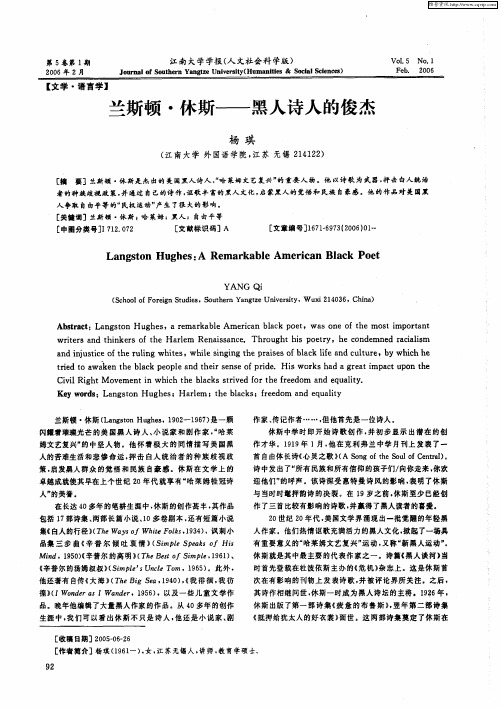
者的种族歧视政 策, 并通过 自己的诗 作. 讴歌丰 富的黑人 文化, 蒙黑人 的觉悟 和民蕨 自豪感 。他 的作 品对美 回. 启 = l I 【
人 争 取 自由 平等 的“ 民权 远 动 ” 生 了很 大 的影 响 。 产 [ 关键 词 ]兰斯 顿 ・ 斯 ;哈 莱姆 ;黑 人 I自 由平 等 体
作才华 。11 年 1月 , 99 他在 克利 弗兰 中学 月刊上 发表 了一 首 自由体 长诗《 心灵之歌 》 A o go eS u o e t 1。 ( S n f h o l fC nr ) t a
人的苦难生活 和悲惨 命运 , 击 白人 统治 者 的种 族歧 视政 抨
策. 启发黑人群众 的觉 悟 和 民族 自豪 感 。休 斯在 文学 上 的
在长达 4 O多年的笔耕生涯中 . 斯的创作甚丰 , 休 其作品
包括 1 部诗集 、 7 两部 长篇小说 、O多 卷剧本 , l 还有短篇小说 集《 白人的行径》 T eWa so i ok ,9 4 . ( h y f Wht F ls 13 ) 讽刺 小 e 品集 兰 步 曲《 普 尔 倾 吐 衷 情 》 SmpeS ek f Hi 辛 ( i l pa so s
兰斯 顿 ・ 休斯 ( n so g e ,1 0- 16 ) Lag tn Hu h s 9 2 9 7 是一颗
闪耀着璀璨光芒 的美 国黑 人诗 人 、 说家 和剧 作 家 , 哈莱 小 “ 姆文 艺复兴” 中坚 人物 。他 怀 着极 大 的 同情描 写美 国黑 的
作家 、 记作者…… . 他首 先是一位诗人 。 传 但 休斯 中学 时即开 始诗 歌创 作 . 初 步显示 出潜 在 的创 并
YANG Qi
( c o lo r inS u is o t en Ya g z iest .W u i 1 0 6,Ch n ) S h o fFo eg t de .S uh r n teUnv riy x 4 3 2 ia
从几首诗歌看兰斯顿 修斯的梦想
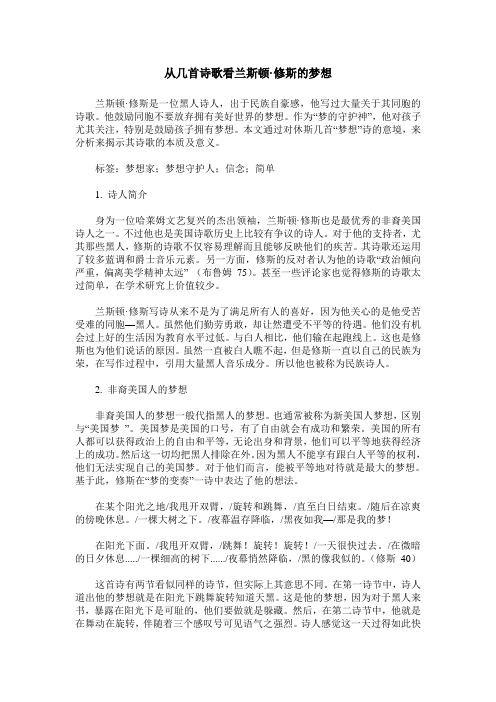
从几首诗歌看兰斯顿·修斯的梦想兰斯顿·修斯是一位黑人诗人,出于民族自豪感,他写过大量关于其同胞的诗歌。
他鼓励同胞不要放弃拥有美好世界的梦想。
作为“梦的守护神”,他对孩子尤其关注,特别是鼓励孩子拥有梦想。
本文通过对休斯几首“梦想”诗的意境,来分析来揭示其诗歌的本质及意义。
标签:梦想家;梦想守护人;信念;简单1. 诗人简介身为一位哈莱姆文艺复兴的杰出领袖,兰斯顿·修斯也是最优秀的非裔美国诗人之一。
不过他也是美国诗歌历史上比较有争议的诗人。
对于他的支持者,尤其那些黑人,修斯的诗歌不仅容易理解而且能够反映他们的疾苦。
其诗歌还运用了较多蓝调和爵士音乐元素。
另一方面,修斯的反对者认为他的诗歌“政治倾向严重,偏离美学精神太远” (布鲁姆75)。
甚至一些评论家也觉得修斯的诗歌太过简单,在学术研究上价值较少。
兰斯顿·修斯写诗从来不是为了满足所有人的喜好,因为他关心的是他受苦受难的同胞—黑人。
虽然他们勤劳勇敢,却让然遭受不平等的待遇。
他们没有机会过上好的生活因为教育水平过低。
与白人相比,他们输在起跑线上。
这也是修斯也为他们说话的原因。
虽然一直被白人瞧不起,但是修斯一直以自己的民族为荣,在写作过程中,引用大量黑人音乐成分。
所以他也被称为民族诗人。
2. 非裔美国人的梦想非裔美国人的梦想一般代指黑人的梦想。
也通常被称为新美国人梦想,区别与“美国梦”。
美国梦是美国的口号,有了自由就会有成功和繁荣。
美国的所有人都可以获得政治上的自由和平等,无论出身和背景,他们可以平等地获得经济上的成功。
然后这一切均把黑人排除在外。
因为黑人不能享有跟白人平等的权利,他们无法实现自己的美国梦。
对于他们而言,能被平等地对待就是最大的梦想。
基于此,修斯在“梦的变奏”一诗中表达了他的想法。
在某个阳光之地/我甩开双臂,/旋转和跳舞,/直至白日结束。
/随后在凉爽的傍晚休息。
/一棵大树之下。
/夜幕温存降临,/黑夜如我—/那是我的梦!在阳光下面。
- 1、下载文档前请自行甄别文档内容的完整性,平台不提供额外的编辑、内容补充、找答案等附加服务。
- 2、"仅部分预览"的文档,不可在线预览部分如存在完整性等问题,可反馈申请退款(可完整预览的文档不适用该条件!)。
- 3、如文档侵犯您的权益,请联系客服反馈,我们会尽快为您处理(人工客服工作时间:9:00-18:30)。
在过去三百多年间,Байду номын сангаас们这种浸透着鲜血和生命的不懈奋斗是值得的,令人敬佩的。怀着一颗炽热真诚的心,兰斯顿·休斯将其毕生精力投入到关于他人民生活的写作和思考中。
无庸质疑,他是其人民和种族的一位伟大的代言人。
我认为,在他近四十年的创作生涯中,兰斯顿·休斯一直都在努力,试图在美国文学史中构建起一个合理正当的美国黑人身份。这篇论文从四个方面展开:种族,历史,政治和文化。
在种族方面,兰斯顿·休斯没有取得太大突破,但是在历史层面他的确确立了黑人的身份,并且在政治层面进一步提升了他们的地位。最后,作为一位世界主义者,休斯基于一个共同的美国梦想,一个为全人类所渴望的共同心愿,歌颂了各色人种的融合。
兰斯顿·休斯诗歌中的黑人身份
兰斯顿·休斯是二十世纪美国黑人文学史上最具影响力的人物之一。在几乎所有的文学体裁中,他的才华都得到展示,但是他对黑人文学的主要贡献在于他将爵士和布鲁斯的音乐元素新颖地融入传统诗歌中。
许多论文的主题大多分析其诗歌的音乐元素,或是他作品中反映的美国社会底层的黑人生活。然而,在其他人文学科(尤其是现在日益热门的民族、种族学科)和后殖民主义文学理论的影响下,越来越多的研究者对其作品中的黑人身份产生浓厚兴趣。
